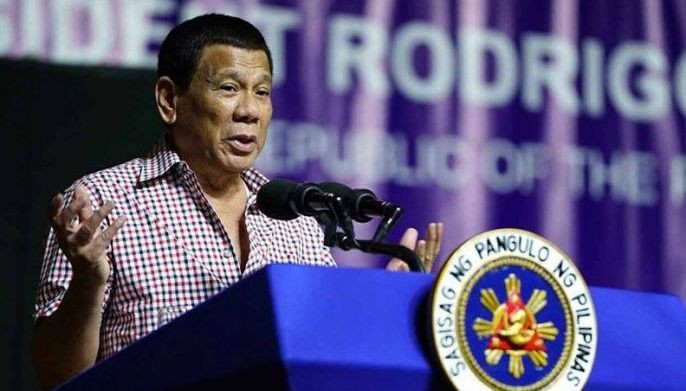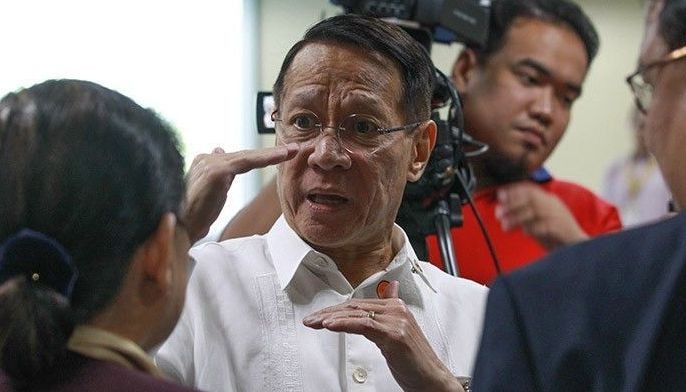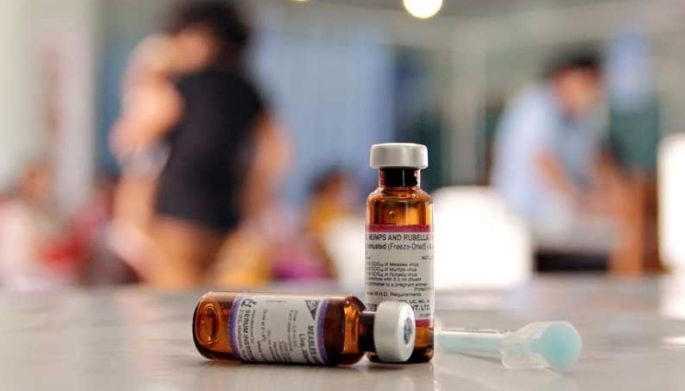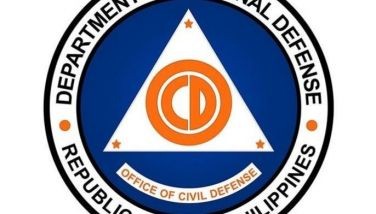How the Dengvaxia scare helped erode decades of public trust in vaccines
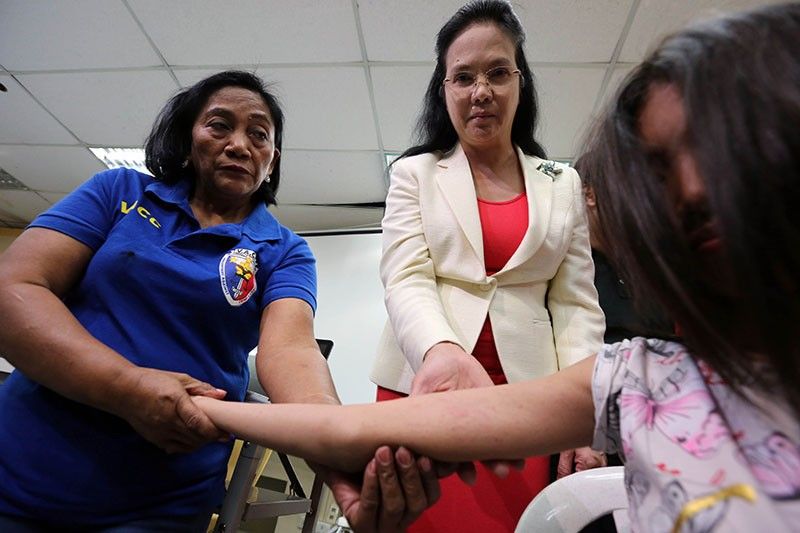
MANILA, Philippines (Update 2: Feb 7, 9:29 a.m.) — Tapped by former Justice Secretary Vitaliano Aguirre II to aid Dengvaxia victims in late 2017, Public Attorney’s Office chief Persida Acosta has since become the face of those allegedly affected by the controversial anti-dengue vaccine.
Her office's forensics team—led by Erwin Erfe—performed its own autopsies on vaccinated children and concluded that Dengvaxia is directly linked to the deaths of at least 105 individuals despite no solid evidence. PAO is an agency that provides free legal assistance to the poor.
But an expert panel from the University of the Philippines-Philippine General Hospital in February last year found that the deaths of 14 children inoculated with Dengvaxia were “totally not related to the vaccine” except for two cases, which may have been because of vaccine failure.
Despite this, PAO insisted that its team has seen a “pattern” in autopsies.
Acosta, who in the past had shed tears in television interviews and spoken in high pitch whenever accusing opponents, has been accused of grandstanding the Dengvaxia crisis and has been blamed for putting the country's immunization programs at risk.
Last December, Doctors for Truth and Welfare, led by former Health chief Esperanza Cabral, called Acosta and PAO forensics head Erwin Erfe “unqualified but noisy people who are largely responsible for the fall of vaccine confidence in the country.”
In a statement last week, Health Secretary Francisco Duque III stressed that Acosta’s “baseless” statements have eroded the agency’s reputation and affected trust in vaccines.
Dengvaxia killed vaccinated children, PAO claims
In November 2017, the DOH suspended the government's dengue vaccination program following the announcement of French pharmaceutical company Sanofi Pasteur that Dengvaxia could cause severe dengue if given to those without prior exposure to dengue. Over 800,000 schoolchildren had already received the vaccine when the administration of Dengvaxia was stopped.
While other countries dealt with Sanofi's announcement by updating guidelines, the news sparked political drama, public outcry and a breakdown of trust in the Philippines.
Shortly after the announcement, the PAO, particularly Acosta and Erfe, began directly linking the deaths of children to the vaccine.
Erfe, whose competence to speak on a matter that is the expertise of forensic pathologists has been questioned by experts like Dr. Raquel Fortun, claimed there is a “pattern” in his autopsies, with the children's organs enlarged and suffered from internal bleeding.He also said that the children's symptoms occurred within six months after getting a shot of Dengvaxia.
“The PAO forensic team had autopsied 105 of those who died of Dengvaxia, they all manifested a 'Dengvaxia death pattern.' They all showed what Sanofi had admitted—that its vaccine can cause deadly adverse effects of viscerotropism, neurotropism, severe dengue and anaphylactic reaction,” Erfe told The STAR.
'Autopsies without training'
But UP-PGH forensic pathologist Maria Cecilia Lim explained that internal bleeding or hemorrhage and even enlargement of organs are not unique conditions for dengue cases.
Pathologist Raymundo Lo, one of those named in the suit filed by PAO against officials of the Philippine Children's Medical Center, slammed the “incompetencies” of Erfe's autopsies, which he said, were performed “without any training.”
The Cabral-led Doctors for Truth and Welfare stressed that Erfe and Acosta “should be held accountable for the thousands of disabilities and deaths that could have been, and could be avoided, were it not for their responsible behavior.”
PAO refused to cooperate with the UP-PGH experts on the conduct of forensic examinations, claiming conflict of interest. The expert panel, however, was composed of pediatricians, pathologists and other specialists with no financial or intellectual ties to Sanofi Pasteur.
RELATED: UP-PGH panel: Only 3 of 14 Dengvaxia-linked deaths due to dengue | PAO chief Acosta cries ‘conflict of interest’ on Dengvaxia probe
When asked by Rep. Johnny Pimentel (Surigao del Sur) if they would be sharing the tissue samples they had obtained with the UP-PGH experts during a House hearing, Acosta exclaimed: “Eh ayaw po ng mga magulang kasi sila [DOH] po ang nagbakuna sa mga anak nila eh! Sir, di ko po isasanla ang aking kaluluwa!”
(The parents don't want to [share tissue samples with the DOH] because it was them who vaccinated the children! Sir, I won't sell my soul!)
A calm Pimentel told Acosta that one objective of the inquiry was to establish proper coordination between the two agencies.
He also said that Acosta's bias could get in the way of the truth.
A visibly exasperated Rep. Ruffy Biazon (Muntinlupa), however, urged the PAO chief to “approach the problem while sober and not rile up emotions.”
Aside from conducting autopsies on alleged Dengvaxia casualties, PAO also led the filing of criminal complaints related to the anti-dengue vaccine. So far, 32 criminal complaints against Duque, former DOH chief Janette Garin and 37 others have been filed before the DOJ.
Damage has been done
More than a year after the controversy that tainted the government’s immunization programs, Dengvaxia has been discredited and pulled from shelves in the Philippines. But the issue has also cast doubt on other vaccines that could protect individuals from life-threatening diseases.
A 2018 study of the London School of Hygiene and Tropical Medicine noted that the country’s “highly-politicized response” to the reported risks posed by Dengvaxia has eroded overall public trust in immunization.
The research, which involved 1,500 participants, found that the respondents who expressed confidence in vaccines declined to 32 percent last year from 93 percent in 2015.
“Kung nagkaroon tayo ng duda o problema sa bakunang ito (Dengvaxia), hindi po dapat ‘yung ibang bakuna. Napakarami nating bakuna na magpoprotekta sa anak niyo sa polio, diptheria, sa tigdas, tetanus. Mga tried and tested itong mga ito at kailangan maibigay natin ito sa ating mga anak,” DOH Undersecretary Enrique Domingo said as early as February 2017.
(If we have doubts or problems with [Dengvaxia], it shouldn't carry over to other vaccines. There are so many vaccines that protect children from polio, diphtheria, measles, tetanus. These are tried and tested and must be given to our children)
Duque, in his statement last week, said the PAO chief's remarks have contributed to a “decline in vaccine confidence and a rise in cases of measles and other vaccine preventable diseases.”
Data from the Department of Health showed that there was a 374-percent rise in the reported measles cases in the Philippines last year.
The reported cases of combined measles and rubella in 2018 ballooned to 18,026 in 2018 from only 3,804 in 2017.
Last year, the agency posted vaccine coverage of 40 percent, far from the target vaccination rate of 90 percent.
RELATED: Catch-up immunization on as measles cases soar
The DOH on Wednesday declared an outbreak of measles in the National Capital Region and Central Luzon.
Data from the DOH Epidemiology Bureau showed that the number of measles cases in Metro Manila had reached 196 from January 1 to 19, as compared to the 20 cases reported in the region in the same period last year.
The San Lazaro Hospital in Manila—a known facility for infectious diseases—has seen 1,355 cases as of February 5. An average of 48 measles cases are registered every day.
In January 2018, the DOH regional office in the Zamboanga Peninsula reported the distrust of Dengvaxia had affected even the numbers in a government deworming program. Health officials said then that most parents across the region refused to give their consent for their children to be given a deworming pill.
“Children are needlessly suffering and dying because of the fear mongering and misinformation that has been allowed to propagate in little over a year. We are headed for epidemics of epic proportion of otherwise preventable diseases,” Doctors for Truth and Welfare said.
The drop in the number of children receiving vaccines prompted President Rodrigo Duterte to urge parents to have their offsprings vaccinated.
“It is alarming to government for people to shy away from vaccination for their children,” he said during the groundbreaking of a hospital in Malabon.
Acosta: PAO shouldn't be blamed
But Acosta said that her office should not be blamed for the low immunization turnout and accused critics of using the rise in measles cases as “diversionary tactic.”
“Hindi namin kasalanan kung ang DOH nanguna na magturok ng isang experimental Dengvaxia at hindi ako laban sa isang bakuna. Wala akong bakunang kinukuwestiyon except Dengvaxia,” she told ABS-CBN News in an interview.
(We shouldn't be blamed if the DOH was the first to use an experimental Dengvaxia and I am not against the use of other vaccines. I'm not questioning any other vaccine except Dengvaxia)
She said in the same interview that "measles outbreak is global." The World Health Organization, which monitors measles cases, said in the 2018 Assessment Report of the Global Action Plan that "although the incidence of measles has more than halved since 2010, it increased in 2017 from 19 to 25 cases per million, with increases seen in four out of six WHO regions."
Among the factors for the outbreaks were "complacency about the disease and the spread of falsehoods about the vaccine in Europe," Dr. Seth Berkley, CEO of Gavi, the Vaccine Alliance, said.
That and a "collapsing health system in Venezuela and pockets of fragility and low immunization coverage in Africa are combining to bring about a global resurgence of measles after years of progress," Berkley also said.
Acosta added that it is not PAO’s responsibility to promote vaccination programs.
‘Vaccine hesitancy’
There is now a global concern over “vaccine hesitancy”—or the reluctance or refusal to vaccinate despite the availability of vaccines. The WHO named it as one of the top threats to global health in 2019.
As WHO put it, vaccine hesitancy “threatens to reverse progress made in tackling vaccine-preventable disease.”
The vaccine for measles, mumps and rubella has been a particular focus of anti-vaccination or “anti-vaxxer” scare campaigns.
States in the US face biggest measles outbreaks in decades, Italians are grappling with an anti-vaccine government and polio vaccinators face violent opposition in Afghanistan and Pakistan.
The WHO stressed that vaccination greatly reduces disease, disabilities and deaths worldwide.
“Vaccination is one of the most cost-effective ways of avoiding disease—it currently prevents two to three million deaths a year and a further 1.5 million could be avoided if global coverage of vaccinations improved,” WHO said.
London School of Hygiene and Tropical Medicine, in its study said two steps should be taken to help regain vaccine confidence in the country.
“Firstly, to reestablish credibility for a damaged reputation of and confidence in the Philippine Department of Health, but secondly for the global players involved to examine this experience and consider its handling of risk in times of uncertainty," it said.
- Latest
- Trending






